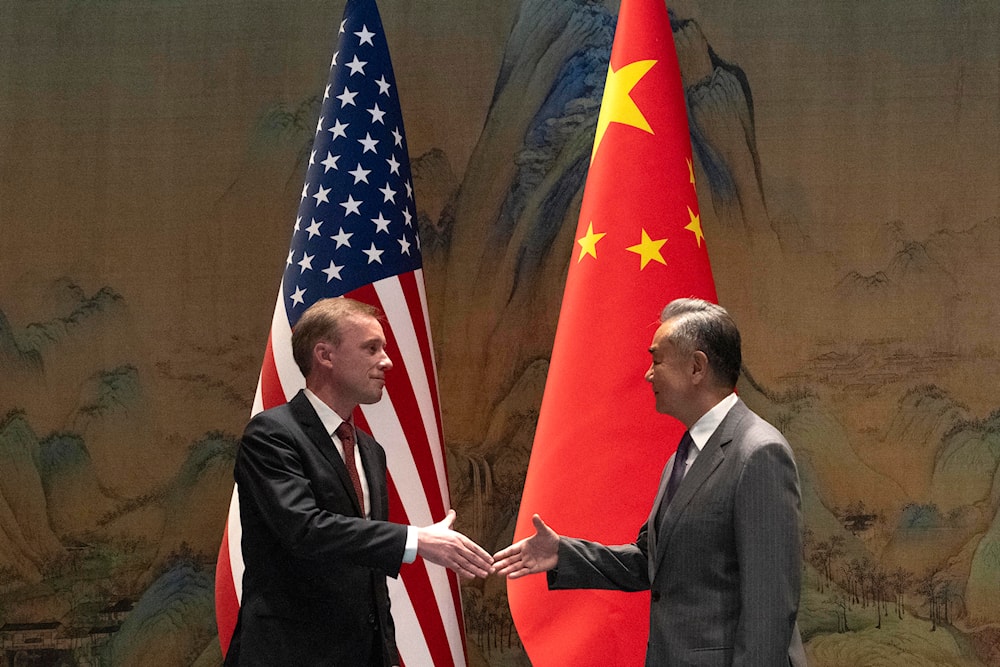China FM says hoping for 'substantive' talks with Sullivan in Beijing
China's Foreign Minister Wang Yi and US National Security Advisor Jake Sullivan meet in the Chinese capital, Beijing.
-

Wang Yi shakes hands with Jake Sullivan before their talk at Yanqi lake in Beijing, Tuesday, Aug. 27, 2024. (AP)
US National Security Advisor Jake Sullivan arrived in Beijing on Tuesday for a three-day diplomatic visit, during which he would be meeting several Chinese officials, including Foreign Minister Wang Yi, to manage both nations' economic rivalries and to discuss matters related to Russia, Taiwan, and the South China Sea.
Sullivan's plane landed at Beijing's Capital Airport just before 2:00 pm local time (0600 GMT), with the official greeted on the tarmac by US Ambassador to China Nicholas Burns and Chinese Foreign Ministry official Yang Tao.
He then headed to a hotel on the outskirts of Beijing.
Wang said he was hoping for "substantive" and "constructive" talks with the top White House official as the two met in the Chinese capital.
"I hope as always the communication will be not only strategic, but also substantive and at the same time very constructive," the Chinese diplomat said.
He added that he wanted the two sides to "help China-US relations move forward towards the San Francisco vision", referring to a framework hashed out by Presidents Joe Biden and Xi Jinping during talks in the US city last year.
Sullivan, meanwhile, said he was "looking forward" to the talks on Tuesday evening and Wednesday.
"We'll delve into a wide range of issues, including issues on which we agree and those issues... where there are still differences that we need to manage effectively and substantively," he said.
"It will be, I think, a very productive round of conversations," he added.
US-China competition
Ahead of Sullivan's visit, an American official revealed that the US seeks to "responsibly" manage the technological competition to prevent it from transpiring into conflict.
"We are committed to making the investments, strengthening our alliances, and taking the common steps on tech and national security that we need to take," an American official said, referring to the removal of restrictions placed on US technologies exported to China imposed under Biden's administration.
China has strongly rejected US efforts to cut Beijing off from technological development, particularly semiconductors, as well as its endeavors with allies to restrict China's electric vehicle industry. Only hours before Sullivan landed in China, Canada imposed high tariffs on Chinese EVs, aluminum, and steel hours.
Taiwan
Regarding the Taiwan matter, the American official said Washington plans to discuss Beijing's alleged "mounting economic and political pressure" on Taipei, claiming its actions risk escalation and destabilization in the region.
Earlier, a Chinese spokesperson stated that the Taiwan issue represents a critical boundary in Sino-US relations that must not be breached, emphasizing that "Taiwan independence" poses the greatest threat to peace and stability in the Taiwan Strait.
"The US must adhere to the 'One China' principle and the provisions of the three joint Sino-US communiques, fulfill its commitments not to support Taiwan's independence," according to a spokesperson.
Russia
Moreover, on Russian matters, the US has repeatedly accused China of aiding Moscow and providing its forces with weapons to be used in the conflict against Ukraine. However, China rejected the allegations raised against it and said it does not directly sell weapons to either Russia or Ukraine.
Wang firmly denied allegations that China is aiding Russia in its war effort in Ukraine during a meeting with his US counterpart Antony Blinken in Laos last month.
Wang reiterated Beijing's stance, underlining that his country would "take forceful measures" to defend its interests, a statement issued by the Chinese Foreign Ministry said.
"China is opposed to being smeared and to false accusations being made against it, does not accept pressure and blackmail, and will take resolute and forceful measures to safeguard its major interests and legitimate rights," he underlined.

 4 Min Read
4 Min Read








